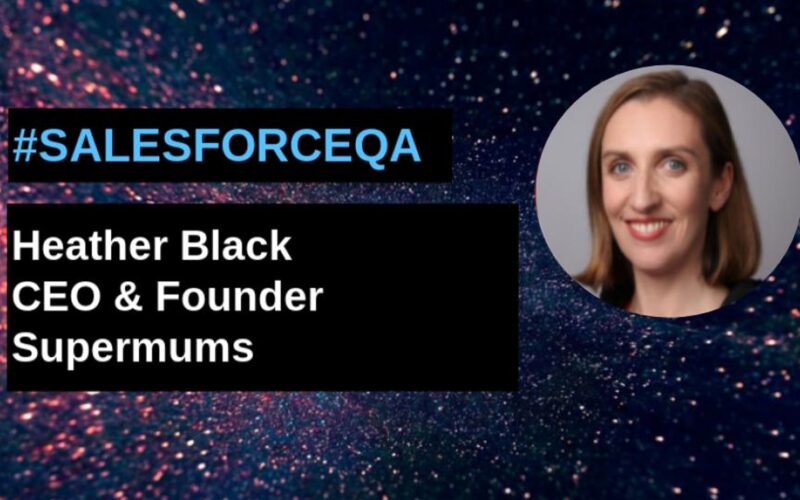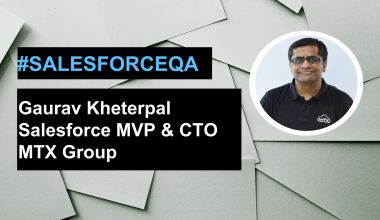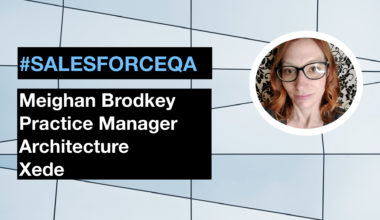In our most recent #SalesforceQA, we caught up with Heather Black, Managing Director and Salesforce Consultant at Economic Change CIC, and CEO and Founder of Supermums. Heather talks about what being a Trailblazer means to her and the importance of the Salesforce community in improving diversity in the ecosystem. Heather mentions the challenges she has faced around starting a new career in Salesforce and also offers the best piece of advice she has received, for people looking to pursue a career in the ecosystem.
Salesforce Republic (SR): For anyone that doesn’t already know you, if you could just provide an introduction about you and what you’re all about?
Heather Black (HB): I run three companies, technically, there’s Economic Change CIC, which is a Salesforce consultancy, and we specialize in working with nonprofits and help them implement Salesforce. I work with 250 customers now and about 500 projects, and have a team of 20 on that side which is exciting, and off the back of that launched Supermums.
Supermums was incubated and financially supported by Economic Change for a couple of years to a point that we managed to get sufficient funding and sponsorship last May. That helped to spin out Supermums as a separate entity. There’s the training side and the recruitment side, so it’s a social enterprise model, we’re trying to get it to a capacity where we can grow it and get investment to grow, so we can further our social mission. We’ve supported 250 mums now, I think it’s increased with the latest cohort that started in May. It’s great to have that across nine countries, now we’ve got a US presence as well and we’re hoping to land in Australia later this year. So, yeah, lots going on.
SR: Can you talk us through how you got into the Salesforce ecosystem, how you started and how you got to where you are at the moment?
HB: I set up a non-profit in 2005 that supported young people to set up their own businesses and to get into employment. So during the course of growing that, I fell into using Salesforce because I needed a system to manage all our young people and our stakeholders and our activities that we were doing, and it was a key part of actually growing our organization. It helped me track everything and communicate everything much better. So I kind of fell in love with the system, to be honest, and I loved getting a bit techie.
I think what I enjoyed most about my business coaching, because I was business coaching young people at that point, is I liked helping them with their strategy and their processes, and that’s what you do as a Salesforce Admin, you’re redefining processes and the way that you work to help hit your performance goals. So the whole thing kind of really clicked for me. Whilst I was running the nonprofit at the time, I grew that from three staff to 40 staff in a year, and went from 100k to one point three million in the year, so that’s how Salesforce helped us grow. It was quite fundamental to that growth. It was a bit of a whirlwind, but it was fantastic going through that journey. But during that time, I had to get my hands really up to speed with Salesforce, so I did the Admin course, the Advanced Admin and then also a consultancy course, Salesforce ran at the time. After a couple of years of really using the system, building it out, getting to grips with it, I decided that’s when I wanted to become a consultant and started the consultancy path, which then led me through other training and development.
When I started to become a consultant myself, I think it was that realization that I had the experience of knowing how to do Salesforce admin, but not necessarily; how do I then work with other people and train other people. Over the first couple of years of doing consultancy, I did additional courses around business analysis, requirements engineering, change management, the additional Salesforce certifications and knowledge, because I just wanted to be good at what I did. I know how to tweak Salesforce, but I don’t necessarily know how to design and bring the whole team along with you on that journey, and so I’ve thoroughly enjoyed learning all the disciplines and really establishing that, and then building a consultancy team around me who follow the same principles and guidance.
It’s taken time to grow the team, I think growing a consultancy is really hard work, to be honest, particularly when you start small and you’re competing with the big boys. There are big consultancies out there that will be favoured by Salesforce in terms of certain client groups and scale. So it’s taken a lot of effort regarding a team that I can trust in. You pointed out before about: how do you do it all? Actually, I’ve got to point, it’s been a hard journey, but I’ve got an amazing team right now who understand and all want to deliver the same professional vigour that I find important, and they’re all really passionate about what they do. I have a really amazing team, so I don’t work beyond the hours that I need, we all step up to the plate around our job responsibilities and that’s partly having a really great leadership team around me as well. I think the biggest thing I learned from my last business was to be patient. I think it’s just having that patience to know that you’re going to get where you want to be, but it’s going to take time and effort and getting the right people around you.
SR: You’ve achieved a lot since you started back in 2005, but what does being a trailblazer mean to you?
HB: I mean, my first business I started in 2005, and then the Salesforce consultancy was 2012. So for a couple of years, it was just myself, and I think what I enjoy in both of those roles and kind of reflect still now, is I enjoy helping other people achieve their potential. Whether that’s working with charities and making them happy because they’ve got better ways of doing things, or it’s working with a mum, and giving them the skills and knowledge they need to feel confident in their new career. That’s what ticks my box, and it’s the same with my team. I say I feel like I’ve got a great team now because I love working with a team where people learn from you, and they get it, and they want to grow and they want to be the best they can be. That’s what is important to me and how I live and breathe every day, it’s what for me, blazing a trail is all about. It’s about showing and telling and sharing everything I learn with other people to help them learn and be happy and confident themselves too.
SR: As a woman in tech, what are some of the challenges when it comes to starting a new career in the Salesforce ecosystem?
HB: I think some of the challenges are that, if you’re starting out in a brand new industry, it’s like anything, you have to learn all new skills, and I think some people think they just get the Salesforce Admin certification and that’s going to be enough to forge a new career. It’s a starting place, but it’s certainly not where you stop. You have to keep learning and developing those additional skill sets to be really good. I sat with the Salesforce Admin cert and it was fine where I was for a couple of years because I was running a non-profit and I could get my head around it and everything. But, then I was at a point where I was going to go out and consult with other people. I knew I needed to get the additional training. I think that the biggest realisation for women is absolutely you can do it, but you have to keep investing in yourself and your training in knowledge development, in order to keep stepping up to the plate with clients.
SR: How important is the Salesforce community when it comes to improving diversity in the ecosystem?
HB: The biggest thing that I’ve wanted to do, and what I’ve seen has been a need with Supermums, is to provide role models and create awareness. With Supermums we went out, we’re targeting women and mums on Facebook who’ve never heard of Salesforce before. We’re going out into these networks of mums and telling them about what Salesforce is as a career, and so it really is our responsibility I think, to see how we can reach out to people who aren’t already in the sector.
Salesforce has done loads of great work around recognising and celebrating Trailblazers from all walks of life and telling their story. We need to get these stories delivered to people who aren’t in our normal (group) and what’s lovely is you see the echo and a lot of them are coming through word-of-mouth of peers in the sector already. That’s probably the best way to reach people because it’s their partners, it’s their sisters, it’s their brothers, it’s kind of the whole family and friends recommendation, that we get a lot of our referrals from, as well as also reaching out through some more cold avenues like Facebook and LinkedIn and volunteering to write blogs and speaking at events and things outside of the sector. I would have never dreamt about what a career in Salesforce would have meant for me until I accidentally fell across the system, and I don’t think people appreciate what the potential is.
I think the Salesforce community is fantastic at volunteering and sharing knowledge within it, which is absolutely fine, but the thing I encourage more people to do is look at where there’s groups and networks of people trying to get back into work or thinking about career options outside of the Salesforce ecosystem, because that’s where we need to amplify the voice still.
SR: How do you think wider businesses and communities can help to improve the numbers of women in tech?
HB: What was really nice over International Women’s Day, is that quite a lot of the companies did blogs and things about what their female staff we’re doing and what their roles were and everything. I think again, it is just raising awareness, if they can do more of that, hold events, write blogs, but also look at how they can engage with perhaps more external groups.
We’ve obviously focused on mums but there’s more maturer groups, like the over 50s, there’s lots of different, I don’t like the word disadvantaged, but you know, groups that are thinking and struggling about career choices. Whether it’s young people for example, which obviously is going to be a massive problem with unemployment again now. We’ve got an opportunity right now to go; well how do we plug into groups that we’re passionate about, maybe as a company or as an individual and help to then raise awareness.
SR: What advice do you have for businesses to implement more flexible working and to carry on giving people more time and flexibility around the way they work?
HB: So it’s a really interesting one, again, I’ve sort of felt the pains of growing a team where you’ve got some people who want to work in the office and some people want to be virtual, and trying to create a culture that is inclusive for everybody, and everybody feels part of it. I’ve always wanted to work from home, I live two hours away from London, so I’ll literally go in for meetings, pop into the office have a team meeting on a Friday and then come back again, and you get that whole challenge of some people want to be in the office full time, and it’s like, well we don’t see you and it’s like, well I’m a virtual worker, you can pick up the phone any time to me.
It’s getting this balance between people who love to be in the office and want to chat and are a bit more social versus those that are quite happy working virtually. I think that balance has disappeared right now because everybody’s working virtually in probably, the Salesforce world specifically, anyway at the moment. So, that level of balance won’t exist but it will be something they face. There are various things that we use but Chatter or Slack as a virtual communication tool, and just making sure that the team that maybe, would be in the office think about sharing and celebrating things and communicating, either by those channels so that those sat at home feel included. I’ve supported flexible working across the organisation but in a way that it’s still got to make business sense for me. They’ve got to work a certain number of hours to make it viable, they’ve still got to be free to accommodate for client calls, and they’ve got design workshops and things from a consultancy point of view. We are flexible but within confines that make it work for all.
SR: What are your predictions for the future of women in tech and what would you want to see more of?
HB: I launched the empower women leadership lunches, because what I’ve identified having spoken to a lot of consultancies, and feeling feedback from trainees as well, is that the answer to supporting more women in tech and supporting them to stay there is having more females on leadership teams. Given the current situation with COVID-19 there’s been a lot of concern about how that’s having a negative knock-on impact on the quality right now, because women are having to pick up all the home-schooling in some cases, and having to deal with cleaning and doing their work job alongside, and are more likely to be furloughed because they’re the ones with childcare responsibilities. So there’s a real negative impact on women at the moment, which I believe won’t be across the board completely, but it seems to be from research and from the media that it is having that more triple impact on them.
I think in order to sustain and maintain a momentum for women in tech, having female leadership at the top that really believes in supporting quality throughout, making sure there’s resources and sponsorship and financial resource, and that attention to it that means if you implement a strategy beneath that, those things are then followed through and retained, and that communication is there. It’s something that does need attention. Within the first empower women leadership lunch I did, I shared a report that Accenture have done around this, and all the different areas that you can support women, and the case is you’re not going to be able to achieve all of that as a business.
If you’re maybe somebody like Accenture, you’re probably trying to tackle it all because they’re big and corporate and have that sort of agenda. But their agenda is to achieve a 50/50 split across all levels of their organisation and all of the areas that you can influence that, it’s fantastic to see all the options, but my recommendation to people on those lunches was; go out to your team and find out which of these are most important to them and then start working on those, because you want to hear the voices of women in your organisation right now; where they need help, where they need support, and then implement those areas. Growth in the organisation I think is one thing, a lot of women get stuck lower down and don’t ascend because of some reason. Equally they need to change their perception and the opportunity needs to be opened up to support them to grow and develop, or even thrive in the role that they’re in right now if they want to stay there, but to feel like they are thriving and they can juggle it all.
SR: What’s the best piece of advice you’ve received throughout your entire career?
HB: The biggest piece of advice people always say is ask questions. Whether it’s with your clients or anybody else, ask questions.
I think the biggest impact that’s had for me is, asking other Salesforce consultancy owners about how they run a consultancy, what’s important to them, and getting advice from people to help me grow my own consultancy. Learning through other people, to further your career is the biggest thing that you can take away, rather than that sort of; ‘you in your isolated box nobody can help.’ Don’t be afraid to reach out, and I think that’s the one thing the Salesforce community is really good at is sharing knowledge, on lots of different channels, and experience, and I think it’s just tapping into the right people for you and what you need to learn about right now.
If you’re a Salesforce professional and would like to join Heather Black, in our Q&A series, please get in touch with us today!


